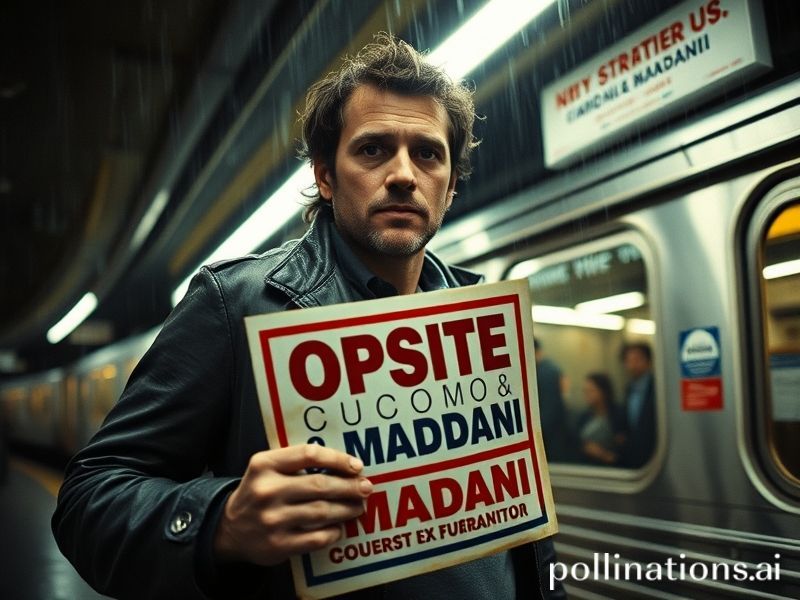Empire State Circus: Unknown Challenger Takes on Cuomo and Mamdani in Democracy’s Latest Reality Show
**The Empire State Rebellion: How a Political Nobody Became the World’s Most Unlikely David**
In the grand theater of American politics, where dynasties crumble slower than week-old bagels and redemption arcs are as predictable as a Swiss train schedule, something delightfully absurd is unfolding in New York. While the global community grapples with climate catastrophes, economic precarity, and the existential dread of another Taylor Swift album, the Empire State has gifted us a political subplot that would make even the most jaded international observer spit out their morning espresso.
Enter the opponent—whose name history will likely forget faster than a TikTok trend—facing off against Andrew Cuomo, the political phoenix who apparently didn’t get the memo about staying dead, and Zohran Mamdani, the socialist darling who’s made “eat the rich” sound almost polite. This David versus Goliath versus Other Goliath scenario has all the makings of a particularly surreal episode of political theater, the kind that makes foreign correspondents thank whatever deity they don’t believe in for American exceptionalism in the realm of political absurdity.
From our international vantage point, this triangular dance of political ambition represents something beautifully, tragically American: the eternal optimism that anyone—yes, even that guy whose name you can’t remember—can challenge the established order. It’s democracy’s equivalent of buying a lottery ticket, except the jackpot is a job that pays less than most European middle managers and comes with the delightful bonus of having your life dissected by tabloids with the surgical precision of a drunken butcher.
The global implications are, of course, microscopic. While European pension systems teeter and developing nations navigate the minefield of climate reparations, New York’s political soap opera offers the kind of distraction that makes one almost grateful for American myopia. It’s as if the universe’s most powerful nation decided that what the world really needed wasn’t leadership but entertainment—political reality TV where the stakes are embarrassingly local but the production values are unmistakably Hollywood.
What’s particularly charming, in that watching-a-train-wreck-while-eating-popcorn kind of way, is how this opponent—let’s call them “What’s-Their-Name” for efficiency—embodies the American dream in its final, mutated form. They’ve presumably looked at Cuomo’s resurrection tour and Mamdani’s progressive paradise promises and thought, “Yes, what this circus needs is another clown.” It’s the kind of optimism that would be almost endearing if it weren’t so existentially exhausting.
The broader significance lies not in policy or governance—concepts as outdated as dial-up internet in modern politics—but in what this says about our collective appetite for political theater. From Tokyo to Timbuktu, humans appear to have accepted that democracy has evolved from noble experiment to elaborate performance art, where the role of the citizen is not to be governed but to be amused. The opponent, bless their delusional heart, is merely providing the latest act in a show that never ends, only occasionally changes cast members.
As this political melodrama unfolds, with its polls and promises and the inevitable scandal that’ll make us all feel better about our own life choices, the world watches with the detached amusement of adults observing children play house. The opponent will probably lose—statistics being the Debbie Downer they are—but in the grand scheme of things, they’ve already won. They’ve reminded us that in the twilight of the American century, even the most quixotic quests deserve their moment in the sun, if only to provide comic relief while the planet burns.
In conclusion, this opponent’s campaign represents democracy’s beautiful, terrible persistence: the belief that anyone can make a difference, even if that difference is merely providing temporary distraction from our inevitable collective doom. It’s almost enough to make one believe in something again—almost.







